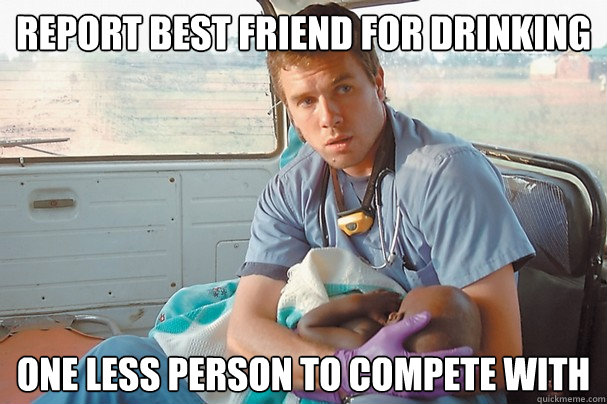- Joined
- Apr 23, 2011
- Messages
- 39
- Reaction score
- 18
I was searching several ethical questions on these boards, there are some on what would you do if you caught your friend cheating, abortion, euthanasia, stem cell research, etc.
Here is one I heard someone get- didn't see it in a past thread, and I wondered what you would answer vs. what you would do in reality.
Your school has a zero tolerance policy on underage alcohol drinking and an university honor code that states that you are obligated report it. Your best friend, I think it was worded as "ever since middle school, you do everything together....", is with you at a party and he brought a six pack and is drinking it. What do you do? Also, if you report him, he gets kicked out of the university, hates you for life, and you crush his future job/graduate school prospects.
Clearly, the right answer is to go with the established protocol, and in the long run, it will steer him on the right path, etc. Of course, a lot of care has to go in how you word this to make it believable. Every time you answer, the interviewer changes the scenario a bit, for example, if you say you'd confront him and plan to report him, your friend will say its a one time thing and promise never to do it again, etc.
But honestly, out of everyone I've ever met in my entire life, no one would report a random person, let alone their best friend for drinking. Heck, 95% of the people I know would join him.
So what would you say, and what would you do in real life? Do interviewers honestly believe people that would say they would report their best friend for this especially given the ridiculous consequences they laid out in the question?
Here is one I heard someone get- didn't see it in a past thread, and I wondered what you would answer vs. what you would do in reality.
Your school has a zero tolerance policy on underage alcohol drinking and an university honor code that states that you are obligated report it. Your best friend, I think it was worded as "ever since middle school, you do everything together....", is with you at a party and he brought a six pack and is drinking it. What do you do? Also, if you report him, he gets kicked out of the university, hates you for life, and you crush his future job/graduate school prospects.
Clearly, the right answer is to go with the established protocol, and in the long run, it will steer him on the right path, etc. Of course, a lot of care has to go in how you word this to make it believable. Every time you answer, the interviewer changes the scenario a bit, for example, if you say you'd confront him and plan to report him, your friend will say its a one time thing and promise never to do it again, etc.
But honestly, out of everyone I've ever met in my entire life, no one would report a random person, let alone their best friend for drinking. Heck, 95% of the people I know would join him.
So what would you say, and what would you do in real life? Do interviewers honestly believe people that would say they would report their best friend for this especially given the ridiculous consequences they laid out in the question?
Last edited:





